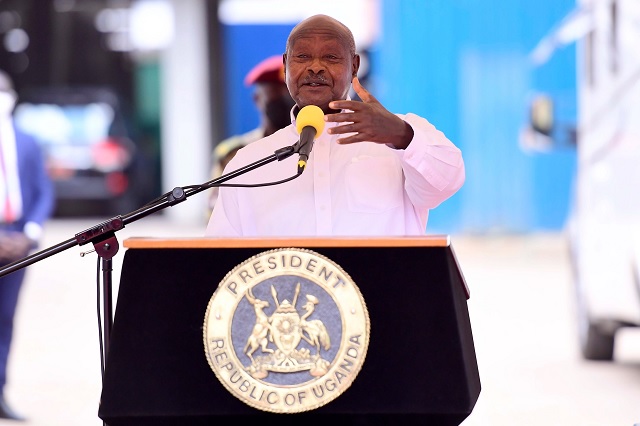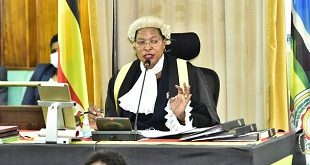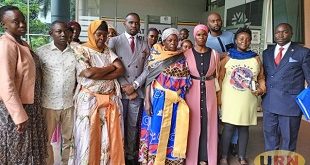
Kampala, Uganda | THE INDEPENDENT | President Yoweri Museveni has blamed the insecurity in the Eastern Democratic Republic of Congo (DRC), on the prevalence of illegal firearms that have been circulating in the country since independence.
He made these remarks on Monday while addressing the East African Community (EAC) leaders virtually during the Third Inter-Congolese dialogue of the Nairobi Peace Process that took place in Nairobi, Kenya with the aim of accelerating the ongoing regional efforts to attain sustainable peace and security in Eastern DRC.
The dialogue attracted many leaders from the region such as President Paul Kagame of Rwanda, Evariste Ndahishimiye of Burundi, and Félix Antoine Tshisekedi of DRC who attended virtually. Kenya’s president, William Ruto of Kenya attended the meeting facilitated by his predecessor, Uhuru Kenyatta.
In his address, Museveni noted that many illegal guns still in the hands of foreign and local armed groups are an impediment to lasting peace in the eastern part of DRC and the entire region. “The main problem is the illegal guns in Congo. These illegal guns have been there almost continuously since Congo’s independence, the guns currently being held by foreign armed groups like the Allied Democratic Forces-ADF from Uganda, the Entarahamwe of Rwanda, and other groups from Burundi and Angola plus the internal Congolese groups such as the Kodeko, M23, Maimai, and others have all these years been killing Congolese and disturbing neighbors,” Museveni said.
Fresh fighting broke out in North Kivu province earlier this month when the M23 rebels clashed with DR Congo troops. Kenyan troops have already deployed in the region as part of a regional force to combat the rebels. The Kenyan troops are on the peace mission together with their EACRF counterparts from Burundi, Rwanda, South Sudan, Uganda, and Tanzania.
Museveni further said that the internal factions in DRC that resulted from the continuous weakening of the state authority in that area (Eastern DRC) can be dealt with by combining political techniques like discussion, and if required, a military method if there is any group that is adamant and does not want peace.
“The political means start with the dialogue. The dialogue should be preceded by a ceasefire where there’s active fighting and disengagement of forces. The peaceful solution should be the outcome of the dialogue,” he said. In the same development, Museveni called for harmonized efforts among East African countries if they are to bring lasting peace to the region.
“These armed groups causing insecurity can be defeated if we harmonize efforts. If any Congolese group doesn’t respect the formula reached after the dialogue, the combined resources of East Africa will be brought down on them. No force can defy the combined efforts of East Africa,” he said.
“These efforts in North Kivu and Ituri, have shown that we have the capacity to deal with these groups in spite of the difficult terrain, the forests, and so on. If the Congolese government agrees, they can invite visitors and visit where we are operating and see what can be achieved,” he added.
President Félix Tshisekedi of DRC who also addressed the dialogue virtually, said he will offer all the support to EAC member states to end the insecurity. “The time to change the narrative of DRC having protracted insecurity is now! We are committed to the EAC- led Nairobi process and long for peace, so we can rebuild the great Democratic Republic of Congo,” the DRC President said.
President Evariste Ndahishimiye of Burundi, who is also the current Chairperson of the East African Community, concurred with Museveni’s call to join efforts to bring long-lasting peace to the region. “We are cognizant of the high expectations the region & international community has in this process. I am appealing to all partners to commit to supporting initiatives aimed at promoting peace and consolidating stability in the region,” he said.
The dialogue was also graced by The Special Envoy of the UN Secretary-General to the Great Lakes region, H.E Huang Xia. Other leaders who were part of the dialogue include representatives from the Government of the United Republic of Tanzania & Republic of South Sudan, and observers from the African Union and the United Nations, and invited members of the Diplomatic Corps.
According to the East African Community secretariat, the Inter-Congolese dialogue has been re-energized and incorporates consultations amongst armed groups in Eastern DRC, local community leaders, civil society, and other relevant stakeholders, with the aim of finding sustainable solutions to the protracted security situation.
The Inter-Congolese dialogue will run up to December 3rd, 2022, and will include consultations with armed groups in Eastern DRC, local community leaders, civil society, and other key stakeholders in order to identify long-term solutions to the security crisis.
*****
URN
 The Independent Uganda: You get the Truth we Pay the Price
The Independent Uganda: You get the Truth we Pay the Price


